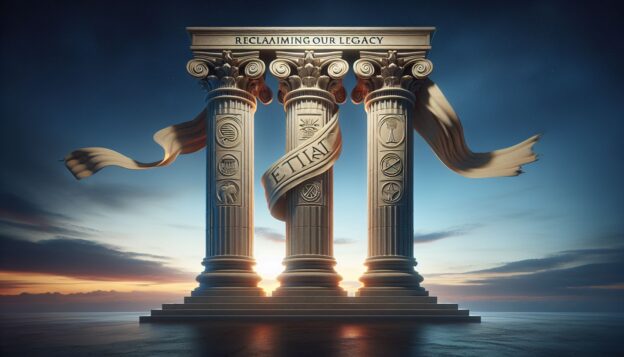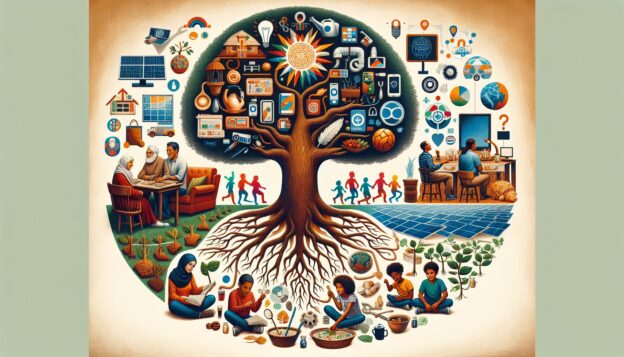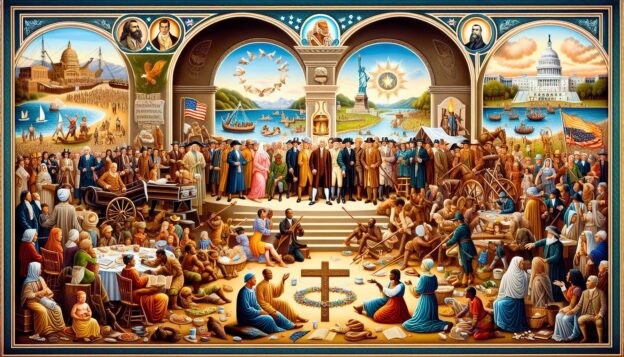In the ever-shifting sands of modern politics, it can seem like the foundational values that have long sustained our nation are under constant assault. Rising tides of progressive ideology challenge the very fabric of American society, seeking to unravel threads of tradition, family, and faith that conservatives hold dear. Yet, in this critical juncture of history, it is imperative that we, as vanguards of time-tested principles, stand resolute. Our conservative values are not merely relics of the past; they are the sturdy beams supporting the future of our great nation.
These values, deeply rooted in the American experience, echo the robust, moral fiber of our Founding Fathers. Men like George Washington, Thomas Jefferson, and John Adams were not just political revolutionaries; they were visionaries who understood the importance of restraining government overreach, upholding individual liberties, and fostering a society grounded in moral virtue. Their understanding of liberty was not as an end in itself, but as a means to elevate human dignity and promote the common good.
The vision championed by conservative leaders is one of limited government—an enduring principle that lights the path for current and future generations. Limited government intrinsically respects the individual’s capacity for self-government, career success, and creation of wealth, recognizing that the most vibrant communities are built from the bottom up, not the top down. It’s a principle Ronald Reagan illuminated when he reminded us that the nine most terrifying words in the English language are, “I’m from the government, and I’m here to help.” This wry observation encapsulates the conservative conviction that individuals, not bureaucracies, are best placed to make decisions about their lives.
In speaking of careers and success, we understand in a profound way that the pursuit of happiness is not merely an abstract right but a concrete journey. Great role models like Booker T. Washington, who rose from slavery to become an influential educator and advisor to presidents, epitomize the conservative value of personal responsibility and hard work. Washington’s belief in self-help and his advocacy for education and economic empowerment for African Americans resonate powerfully within conservative circles as we support policies that encourage entrepreneurship, education, and moral agency, rather than dependency.
Faith and family are the dual pillars of our societal structure, essential to the conservative worldview. The sacred institution of marriage, the sanctity of human life from conception to natural death, and the missionary spirit to serve the less fortunate are key aspects of conservative Christianity. A culture that values and protects the family unit is a culture that thrives, for families nurture the citizenry that will inherit and lead the Republic. Conservative policies aim to protect these institutions from progressive ideologies that seek to redefine them or minimize their importance.
In the realm of education, which is undeniably the springboard for our next generation’s leaders, conservatives emphasize the importance of school choice, local control, and curriculum transparency. Parents must be the primary educators of their children, guiding them not only in academics but also in moral and spiritual matters. We must oppose the encroachment of indoctrination in schools, whether it is the revisionist history of the 1619 Project or the radical gender theories that undermine biological realities and parental rights.
Defense of the Second Amendment also stands front and center in the conservative platform, recognizing that the right to bear arms secures all other rights. This isn’t about promoting violence; it’s about ensuring that each American has the means to defend themselves, their families, and their property against any who would seek to harm or oppress them. The historical significance of this right cannot be overstated; it was the armed citizenry that allowed our nation to obtain its freedom and helps to secure it to this day.
Lastly, we cannot overlook foreign policy, where conservative values dictate a strong national defense coupled with a judicious approach to foreign entanglements. “Peace through strength” is not just a mantra but a proven strategy, as seen in the strength and resolve of leaders like Winston Churchill and Margaret Thatcher, whose fortitude in the face of tyranny preserved freedom for their countries and inspired the world.
Today, amidst a cacophony of radical, ‘progressive’ proposals—from the Green New Deal to the calls for socialized medicine—it is critical that the wisdom of conservative thought leads the way. Let’s strive to be informed, engaged citizens who advocate for fiscal sanity, personal liberty, and a foreign policy that recognizes the complexities of global leadership without surrendering to the siren song of endless wars or the false panacea of utopian internationalism.
As we confront the currents of cultural and political change, we must do so not as unmoored vessels but as steadfast ships, with our conservative values as the compass guiding us through turbulent waters. Let us heed the lessons of history, hold fast to the truths we know are self-evident, and work tirelessly to ensure that the beacon of freedom continues to burn brightly for all future generations to witness and embrace.
In the final analysis, the time for complacency has passed. The work that lies ahead requires each of us to contribute our voice, our strength, and our conviction to the defense of the principles that make America the last, best hope of Earth. Stand firm, my fellow patriots. For in the preservation of our conservative values lies the blueprint for a future filled with promise, prosperity, and peace.









